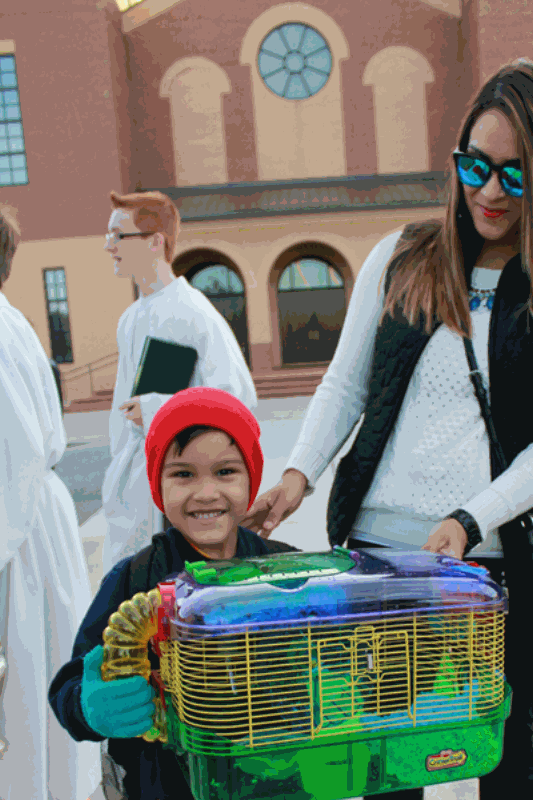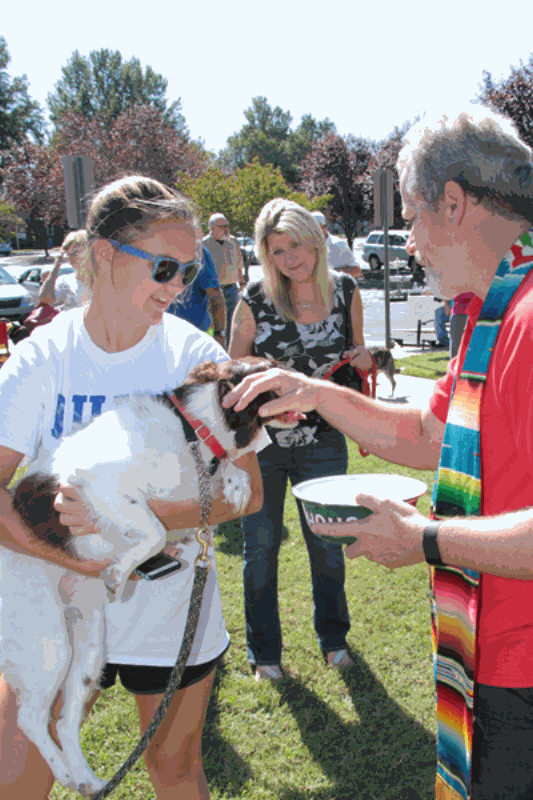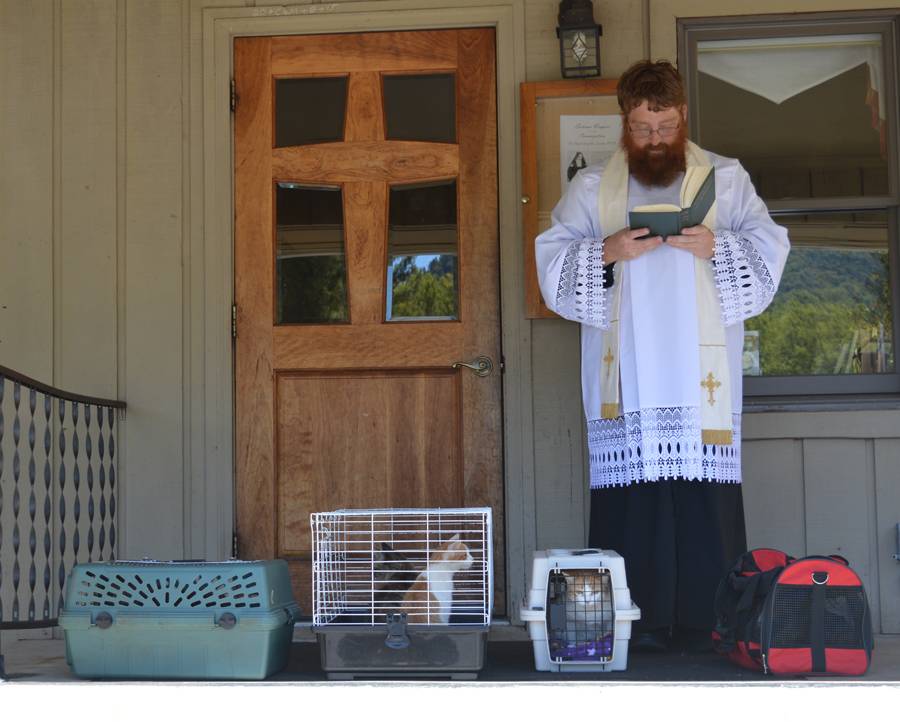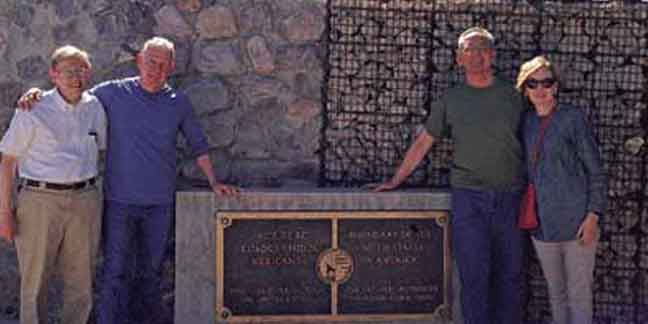 Pictured: Jesuit Father John Michalowski, parochial vicar at St. Peter Church in Charlotte, along with three St. Peter's parishioners, Bob Macpherson, Martha Schmitt and Dave Zablotny, made a three-day mission trip in early May to the Kino Border Initiative located at the Arizo-na-Mexico border. (Photos provided by St. Peter Church)CHARLOTTE — Jesuit Father John Michalowski, parochial vicar at St. Peter Church in Charlotte, along with three St. Peter's parishioners, Bob Macpherson, Martha Schmitt and Dave Zablotny, made a three-day mission trip in early May to the Kino Border Initiative located at the Arizona-Mexico border.
Pictured: Jesuit Father John Michalowski, parochial vicar at St. Peter Church in Charlotte, along with three St. Peter's parishioners, Bob Macpherson, Martha Schmitt and Dave Zablotny, made a three-day mission trip in early May to the Kino Border Initiative located at the Arizo-na-Mexico border. (Photos provided by St. Peter Church)CHARLOTTE — Jesuit Father John Michalowski, parochial vicar at St. Peter Church in Charlotte, along with three St. Peter's parishioners, Bob Macpherson, Martha Schmitt and Dave Zablotny, made a three-day mission trip in early May to the Kino Border Initiative located at the Arizona-Mexico border.
The Kino Border Initiative is a binational organization that works with migrants in Nogales, Ariz., and Nogales, Mexico. Sponsored in part by the Jesuit Refugee Service, its mission is to promote U.S.-Mexico border immigration policies that affirm the dignity of the human person.
The small group from St. Peter's went to Nogales to experience the reality of so many displaced, deported and asylum-seeking persons – a daily reality along the border.
Father Michalowski noted, "As members of the Social Justice Committee at St. Peter Parish, we knew of the American bishops' concern for the U.S. government policies which have been breaking up families, where one or the other of the parents is here illegally and some or all of the children were born in the U.S. and are American citizens. We were also aware that because of the stalemate in Congress, due to an unwill-ingness to compromise, no meaningful immigration reform has been able to be passed in years.
"What we saw and heard on both sides of the border in Nogales only confirmed what the bishops and others have been saying."
The KBI pilgrims shared their experience with fellow parishioners June 5 at St. Peter's Biss Hall with a presentation between Sunday Masses.
"No matter what your viewpoint is on immigration policy, the face of these migrants and their stories will make you feel heartbroken, so sad, ashamed and angry," Schmitt said.
The first stop for the group was the KBI Comedor, a Mexican-version of a soup kitchen, in Nogales, Sonora/Mexico.
At the Comedor, Schmitt said, she met a man who had been recently deported after living in Nashville, Tenn., for 19 years. "He left behind his wife and three daughters, two who had been born in the U.S. I asked if he planned on trying to reunite with them and he said, 'Of course. I will go back as soon as I can and have to trust in God,'" Schmitt recounted.
The following day they visited the Kino shelter for women and children who have no place to live and are in the process of being deported. According to Schmitt, these women and their children are typically victims of domestic violence in their home countries and seek asylum in the U.S.
The humble shelter typically houses eight women, who share a small kitchen and living room, bathroom and two bedrooms with bunk beds. At the time of their visit, they met a woman from Honduras with four children there.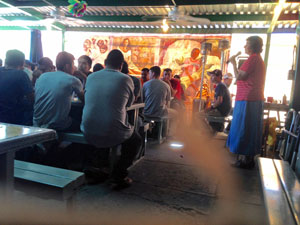
 "The children had spent a year hiding in small towns in Mexico, sleeping and eating on the streets for much of the time," Schmitt said. The mother of the children told them that her children "felt like they were on some kind of wonderful vacation now that they were in the apartment."
"The children had spent a year hiding in small towns in Mexico, sleeping and eating on the streets for much of the time," Schmitt said. The mother of the children told them that her children "felt like they were on some kind of wonderful vacation now that they were in the apartment."
The pilgrims hope to continue raising awareness of the immigration problems, as well as make a return trip to Kino with another group.
"As a person who had the opportunity to see these faces and hear stories firsthand, I want to make sure others hear these stories so changes can be made to policies to help make the entire immigration situation more humane," Schmitt said.
"It is not my job to question their journey, but only to know they are all God's people on a journey, trying to do the best they can for them-selves and their families."
– Rico De Silva, Hispanic Communications Reporter
"The children had spent a year hiding in small towns in Mexico, sleeping and eating on the streets for much of the time," Schmitt said. The mother of the children told them that her children "felt like they were on some kind of wonderful vacation now that they were in the apartment."
 CHARLOTTE — A plaque commemorating the Sept. 4 canonization of St. Teresa of Calcutta has been added to the pro-life memorial at St. Vincent de Paul Church.
CHARLOTTE — A plaque commemorating the Sept. 4 canonization of St. Teresa of Calcutta has been added to the pro-life memorial at St. Vincent de Paul Church.
The plaque, which features the inscription “Saint Teresa, help us promote a culture of life,” was funded by the Knights of Columbus Council 9560.
Approximately 75 people attended the Oct. 16 blessing service, which was led by Father Mark Lawlor, pastor, and organized by the parish’s Respect Life Committee and Knights of Columbus council.
Two Missionaries of Charity sisters and Sisters of St. Vincent de Paul were among the attendees.
— Diane Hoefling


SYLVA — Father Joshua Voitus blessed parishioners' pets and cars Oct. 9 outside St. Mary, Mother of God Church. (Photo by Della Sue Bryson, correspondent)
KERNERSVILLE — Oblates of St. Francis de Sales Father Paul Dechant, pastor, led a blessing of the animals service Oct. 1 outside Holy Cross Church. Parishioners brought their pet dogs, cats, bunnies – even a turtle, frog and a goat made an appearance. The event also featured information from local animal shelters and assistance organizations. (Photo by John Bunyea, correspondent)
 Jubilarians honored at Mass Aug. 4
Jubilarians honored at Mass Aug. 4
CHARLOTTE — Bishop Peter Jugis was joined by Bishop Emeritus William Curlin, Benedictine Abbot Placid Solari and more than 30 other priests for the annual jubilarians Mass Aug. 4 at St. Patrick Cathedral. Four jubilarians were honored this year for their longtime service to the Church: Father Joseph Ayathupadam, Father James Cahill, 55 years; Father Albert Gondek, O.S.F.S., 50 years; and Monsignor Anthony Marcaccio, 25 years.
Monsignor Marcaccio, pastor of St. Pius X Church in Greensboro, was the only jubilarian in attendance.
During his homily, Bishop Jugis spoke about the concepts of love and gratitude, citing scripture passages and their relation to the gift of the priesthood.
"Jesus tells His apostles at the Last Supper, 'This I command you, love one another.' Those words of Jesus intrigued Pope Emeritus Benedict XVI and caused him to ask the question, 'Command? Can love be commanded?' Since love as we commonly understand it has become an unpredictable human emotion and sentiment," Bishop Jugis explained.
"Pope Benedict says, 'Of course love can be commanded.' For we love with Christ's love that is planted in us, which takes us way beyond our human limitations and our frailty.
“The love of God has been poured into our hearts through the Holy Spirit who has been given to us, St. Paul says in his letter to the Romans. ‘Remain in me and I remain in you,’ Jesus says.”
Bishop Jugis noted that our priests who are celebrating their jubilee anniversaries of priesthood this year have been loving and serving with the love of Christ for many decades.



 "An anniversary of ordination is always celebrated with sentiments of gratitude to the Lord – gratitude for the opportunity to serve," he said.
"An anniversary of ordination is always celebrated with sentiments of gratitude to the Lord – gratitude for the opportunity to serve," he said.
"It is such a tremendous blessing He bestows upon us priests, giving us an opportunity to serve. Gratitude for being called to enter the service of Christ the High Priest and to serve our brothers and sisters on their path to salvation. To serve Him by offering them the sacraments, by proclaiming the Gospel, and by shepherding them with love and courage as a good shepherd would."
Bishop Jugis shared a special excerpt from a prayer of St. Patrick which speaks of the saint's gratitude for his gift of the priesthood.
"It seems that each priest could repeat this prayer in expressing his gratitude for the priesthood: 'Who am I, Lord, that you called me to this work?'
"Jesus says to the apostles at the Last Supper, 'It was not you who chose me, but I who chose you and appointed you to go and bear fruit that will remain.'
"Not by any merits of our own, but because of the greatness of His mercy did He call us to the priesthood."
It is with the humble gratitude of the publican, not the proud Pharisee, that priests give thanks for their vocation, he said.
He also pointed out that as the priests processed into the cathedral before Mass, they entered through one of the diocese's three doors of mercy.
"The Lord has extended His mercy through each one of us, His priests, to make us all ministers of His mercy," he continued. "The mercy of Christ is communicated through the sacraments that we celebrate, through the homilies we deliver, through the Eucharist, through the personal witness of our lives.
"What a grace to be so closely associated with the mercy of Christ which has saved the world!"
Bishop Jugis prayed that as the Church honors the jubilarians, that all priests would be grateful for the opportunity to serve.
"May we return to Him 30-, 60-, 100-fold for all that He has given us."
— SueAnn Howell, Senior reporter
 A voice for evangelization. A Catholic perspective to the news. This has been the two-fold mission of the Catholic News Herald since its first edition was published Sept. 6, 1991.
A voice for evangelization. A Catholic perspective to the news. This has been the two-fold mission of the Catholic News Herald since its first edition was published Sept. 6, 1991.
Nearly 1,000 editions later, the Diocese of Charlotte’s newspaper still strives to fulfill that mission – through three popes, four bishops, dozens of church and parish hall dedications, and countless stories about people doing God’s work in our 92 parishes and missions.
A JOINT VENTURE
Before the diocese started its own newspaper, the NC Catholic was the newspaper for the entire state. Raleigh Bishop Vincent Waters founded the NC Catholic in 1946.
Its first editor, Dale Francis, later recalled, “It was an impossible idea that a diocese of 12,000 Catholics, scattered over 48,843 square miles, the smallest percentage of Catholics in the nation, should have its own newspaper. It was more impossible that it should be done in 1946, the first post-war year when there were shortages in everything. But Bishop Vincent S. Waters was a young man in his first year as Bishop of Raleigh. The word impossible was not in his vocabulary.”
When the Charlotte diocese was carved out of the Raleigh diocese in 1972, the two bishops decided to continue publishing the newspaper as a joint venture.
Charlotte Bishop Michael Begley appointed Father (later Monsignor) William Wellein as the local reporter. As the young diocese grew, so too did the amount of news.
In 1979 the NC Catholic opened an office in Charlotte and hired Mary Coyne Wessling, a graduate of Marquette University’s School of Journalism, as assistant editor.
Besides having to cover all of western North Carolina, Wessling later recalled, “Another big challenge was that I was the first full-time NC Catholic employee in the Diocese of Charlotte. So everywhere I went, people were either very grateful for my presence or they were very hostile that I wasn’t there a long time ago.”
Of all the big stories she covered, Wessling said, “the best stories I ever covered were always the stories of people who I call living saints. People who, in their everyday activities, never thought they were doing anything beyond the ordinary, but were probably some of the most grace-filled people.”
In 1980, the Charlotte newspaper staff began transmitting stories electronically to Raleigh – cutting-edge technology at that time.
“By hooking up a computer terminal to the telephone system, the Assistant Editor transmits her stories at a rate of 200 characters per second. Stories written the same day the paper goes to press are now able to be included in that issue. Accuracy, as well as speed, has improved with the use of this system,” Sister Miriam Miller, OSF, described in her book, “A History of the Early Years of the Roman Catholic Diocese of Charlotte.”
Sister Miriam also noted, “The communications office can also boast of having a fully-equipped darkroom and a list of professional writers from within the diocese who contribute to the paper regularly. All these advances have provided for better reporting of the news of the Diocese of Charlotte through the diocesan newspaper.”
A NEW ERA
But western North Carolina was growing, and by 1990 diocesan leaders thought it might be time for the Charlotte diocese to start its own newspaper.
Both North Carolina bishops convened a task force in each diocese to evaluate the NC Catholic and Charlotte’s other options. After months of surveying readers and pastors, Charlotte decided to forge a new path – recommending that a diocesan newspaper be established to reach the home of every Catholic in the diocese.
In 1991 Monsignor John McSweeney, then serving as Charlotte’s chancellor, told the NC Catholic that the new newspaper would be designed “to foster a strong local identity among a Catholic flock that has grown threefold since 1972” and to be “a useful tool” for evangelization.
“The growth of the Catholic population has brought a need for a stronger sense of local identity as a diocesan church,” Monsignor McSweeney said.
The task force said the paper’s mission should be “to promote the evangelization ministry of the Catholic Church by producing a quality publication, offering a Catholic perspective to the news and helping people to realize the connection between their lives and Jesus Christ.”
NC Catholic announced the split in its June 16, 1991, edition, with the headline “End of an Era.”
Bishop (later Archbishop) John Donoghue hired Bob Gately, a veteran newsman, as editor. Two associate editors, a general manager and several correspondents rounded out the initial staff.
Bishop Donoghue selected the name “Catholic News & Herald” after a reader contest whittled the possibilities down to a few finalists, Monsignor McSweeney recalls.
The name clearly described the bishop’s vision for the paper: “I want the paper to be a newspaper and not simply a house organ or parish bulletin. I want it to be a paper that reports the news. But I also want it to be a paper that reports the Church’s teaching. Now a lot of controversy comes up in both secular and Catholic papers. I have no problem with Catholic papers reporting that controversy, but I want to be sure that we also stress what the Church’s position is on these issues.”
The paper would also become an integral part of Bishop Donoghue’s “Decade of Evangelization” from 1990 to 2000.
In a column in the Sept. 6, 1991, edition, he wrote: “With this inaugural issue of The Catholic & News Herald, the Diocese of Charlotte embarks on a new, exciting and challenging venture. There is also a note of sadness, however, because the NC Catholic which served the needs of our people for so many years will no longer be a part of our diocese.
“I want The Catholic News & Herald to be a voice for evangelization. The unique challenge for all of us is to find an effective way to bring the saving message of Christ to all our people, to develop ways by which we can share the good news with our brothers and sisters, especially those who have fallen away from the Church, and with the thousands of people who are unchurched and have never had the opportunity to learn about Christ. This, I believe, is the mission of The Catholic News & Herald.”
“I want The Catholic News & Herald to be vigorous in expounding the truth,” he continued, adding, “All those events which prove so interesting and bind us so close to our Catholic neighbors – social events, youth ministry news, parish events, and a host of activities sponsored by our Catholic offices, institutions and agencies – will be published in The Catholic News & Herald.”
In an interview with the NC Catholic, Charlotte’s first bishop, Bishop Michael Begley, echoed his successor’s goal that the role of the new newspaper was to “make the doctrines of the Church available to all our people and to provide current views on the changes going on within our Church and our world,” as well as to bring the people of our diocese closer together.”
“We want the people of Murphy to feel just as much a part of what this diocese is about as the people in Charlotte,” he said. “The paper helps to do that.”
Just like the NC Catholic, the Charlotte paper was a tabloid format, printed weekly during the school year and biweekly in the summer. It was mailed to every registered family in the diocese – a circulation of about 31,000 in its first year – and funded by a parish assessment of $15 per family per year.
The decision to mail the paper to every family that comprises the Body of Christ in western North Carolina, plus its emphasis on covering the entire diocese, Monsignor McSweeney recalls, was squarely in line with the bishop’s goal of evangelization.
Evangelization would be most effective, he said, by providing everyone with a quality source of information about Church teaching. Transparency, too, especially about the diocese’s finances through publication of an annual financial report, was important from the beginning, he said.
The first edition featured a front-page article about Bishop Donoghue’s opposition to changes in the number of holy days in the U.S. liturgical calendar, an eight-page report about the diocese’s plan to regionalize Charlotte’s parish schools, a story about the growing Hispanic population in North Carolina, a feature story on the Sisters of Mercy, opinion columns and letters to the editor, national and world news, and movie reviews.
The first edition also featured a page of news in Spanish, and a few weeks later the paper added regular news in Vietnamese, too.
Father Silverio Rueda of the Hispanic Catholic Center produced content for the Spanish section, and Sister Cecilia Tong of the Vietnamese Apostolate provided content in Vietnamese and English. Carl Foster, director of the African-American Catholic Ministry, was also a frequent contributor in the paper’s early years.
This attention to cultural diversity is a point of pride for Monsignor McSweeney, who recalls that the newspaper strove to represent all of the cultures found in the growing diocese.
Bob Gately served as editor until he reluctantly retired in 1995 because of ill health. He died in 2001, aged 73.
“During his tenure with The Catholic News & Herald, Gately frequently wrote politically charged commentary linking the teachings of the Catholic Church with current national and international issues,” wrote Joann Keane, the Catholic News Herald’s third editor.
Gately was credited with launching the newspaper with what in 1991 was a state-of-the-art computer-based production process, even though he did not have much experience with computers himself.
“His efforts paid off as the Charlotte diocesan newspaper became one of the first diocesan papers in the nation prepared totally within an electronic environment,” Keane wrote.
CHANGES AMID CONSTANCY
The newspaper was revamped in 1998 under the tenure of the newspaper’s second editor, Mike Krokos. Readers and pastors were again surveyed, and based on their feedback changes included a graphic redesign and renewed emphasis on its original mission of covering parish news.
“It was a pretty big undertaking, but with our staff – Joanne Keane, Jimmy Rostar and Julie Radcliffe – and the focus group, we were able to cosmetically bring a fresh, new look to the paper,” Krokos recalls.
That 1998 readership survey pointed out suggestions for improvement, but more than anything else it confirmed that readers valued the newspaper and looked forward to reading it. Seventy percent of readers said they’d read the last four issues, and they liked the mixture of content.
In 2007, the newspaper went through another readership survey, under the tenure of Editor Kevin Murray. Fifty-three percent of readers said they’d read the past four issues, but the paper was competing for time in people’s increasingly busy lives, and many readers said they did not feel the paper was providing enough local news and information about Church teaching.
In response, the staff redesigned the paper and beefed up content aimed at families, especially information on Catholic teaching.
“It is gratifying that through all of the reader surveys up to present day we learned that the majority of our Catholics read every issue of the paper,” said Jim Kelley, diocesan development director, who was on the task force to launch the newspaper and who oversaw its operations for a number of years. “We have also worked hard to give our parishioners what they want and what they need: Church teaching, stories about people, and coverage across the whole diocese.”
Murray recalls setting the groundwork for digital production as well as venturing into social media, “which was a rather new and revolutionary idea at the time.”
Two new ventures were an occasional podcast, “docPod,” that ran from 2006 to 2009, and the launch of a diocesan YouTube channel in 2009 that now has over 350 videos that have been viewed a total of more than 204,000 times.
RECENT YEARS
In 2010 the paper went through a major design overhaul under new Editor Patricia Guilfoyle. Changes included a shift to a more compact tabloid format to fit changing printing and mailing standards, new typography and color palette, shuffling of content to prioritize parish news and catechetical information, a new emphasis on local commentaries – and a slight name change. The ampersand was dropped to simplify the name to “Catholic News Herald,” more practical for the paper’s new online and social media channels.
The newspaper’s original mission statement, “Serving Catholics in Western North Carolina in the Diocese of Charlotte,” was also restated to “Serving Christ and Connecting Catholics in Western North Carolina.”
In addition, the paper’s frequency was changed from about 44 editions per year to 26 per year in the 2010-’11 fiscal year, based on the 2007 readership survey that found readers wanted to continue receiving the printed newspaper but also wanted more immediate local news online.
Print circulation has doubled from about 31,000 in 1991 to nearly 60,000 in 2016. It continues to be mailed every other Friday to every registered family at the diocese’s 92 parishes and missions, in addition to clergy and religious in North Carolina, and paid subscribers elsewhere. But print circulation is just one aspect of the Catholic News Herald’s now 24/7 news operation.
In 2011, the paper began publishing online. Its website www.catholicnewsherald.com, which was redesigned in August, is visited by an average of 18,000 people each month. Each year, visitors view more than 400,000 pages full of pictures, videos and stories.
The paper’s Facebook page, launched in 2011, now has nearly 5,000 followers.
Social media presences on Twitter and Pinterest were added in 2012, followed by the live video social media app Periscope in 2015.
While a lot has changed over the years, the Catholic News Herald continues to be honored every year by the Catholic Press Association for its writing, photography, design and, most recently, for its online reporting and videography.
All of this work has been accomplished through the diocese’s annual communications assessment, which remains the same today as it was when the newspaper first rolled off the presses in 1991: $15 per registered family.
“Over the past 13 years that I have been involved with the Catholic News Herald it has shown itself to be very nimble in the service of the diocese amid a changing communications landscape,” said David Hains, who as diocesan communications director now oversees the Catholic News Herald.
“This attribute will make it relevant to Catholics for decades to come.”
— Patricia L. Guilfoyle, editor
Read the past editions of the Catholic News Herald online.
Tell us what you think
In the inaugural edition of the Catholic News & Herald, Editor Bob Gately noted, “Our intent is to provide at least something that will be of interest to every Catholic in the diocese. It’s up to you to let us know whether or not we succeed.” We repeat that challenge now! Please let us
know how we are doing. Contact Editor Patricia L. Guilfoyle at 704-370-3334 or This email address is being protected from spambots. You need JavaScript enabled to view it..
Past editors share their stories
 CHARLOTTE — The Catholic News Herald has seen six editors since its inception in 1991. Each faced unique circumstances during their tenure as the Diocese of Charlotte grew from a mission diocese to the large, dynamic Catholic community it is today.
CHARLOTTE — The Catholic News Herald has seen six editors since its inception in 1991. Each faced unique circumstances during their tenure as the Diocese of Charlotte grew from a mission diocese to the large, dynamic Catholic community it is today.
The late Robert Gately was the diocesan paper’s first editor, serving from 1991 to 1995. Michael Krokos followed, serving from 1996 to 1998. Joann Keene, who started out working on staff for The NC Catholic, the combined and joint publication for both the Raleigh and Charlotte dioceses under the direction of Bishop John F. Donoghue, ran the paper from 1999 to 2000.
Next followed Kevin Murray, who served for seven years from 2002 to 2009. Heather Bellemore served as interim editor from 2009 to 2010 after Murray left. After a nationwide search, Patricia Guilfoyle, the current editor, came aboard in 2010.
Recently several of the Catholic News Herald’s former editors shared their reflections on serving the growing Diocese of Charlotte during their tenure.
WORKING WITH THE BISHOPS
Mike Krokos, who served under Bishop William G. Curlin during his three years as editor, remembers Bishop Curlin as “a faith-filled, welcoming shepherd who never made anyone feel uncomfortable in his presence. He talked the talk and walked the walk as far as someone living out his faith in all he did.”
Kevin Murray served under Bishop Peter J. Jugis during his seven years as editor. “Regardless of the situation, Bishop Jugis had a serenity and grace that was admirable,” Murray said. “He also had a guarded and fun sense of humor. I appreciated the attentiveness and discernment he brought to various matters, even if it was some trivial aspect of the newspaper and such – he made me feel like my work was important and significant, which only made me want to do a quality job and do him justice.”
FOND MEMORIES
“I fondly remember Bishop Curlin’s stories of his friendship with Mother (now St. Teresa of Calcutta), and the way she impacted his life of faith,” Krokos recalled. “Their friendship started when he was a priest in the Archdiocese of Washington, but it continued through his years in Charlotte until she passed away in 1997.
“I still remember the day she died. When we had a press conference at the Catholic Center open to the secular media, Bishop Curlin got emotional reflecting on their friendship and how Mother had really helped him grow in his life of faith.”
Murray said that some of his fondest memories are from when he traveled the diocese. “I got to visit a lot of amazing places and meet a lot of interesting folks while on the job.”
Keane was present when the current Charlotte Catholic High School building was selected.
“I remember walking with Mercy Sister Paulette Williams, then principal of CCHS, and Bishop Curlin, both wearing hard hats as they toured the former Stearnes Catalytic building on Pineville-Matthews Road with plans to renovate the facility into a state-of-the-art high school,” she said.
“As we toured the facility, I could hardly visualize how they could modify this office building into a high school. Sister Paulette commented on the ability of CCHS to eventually double its capacity, up to 1,200 students. It didn’t take too many years for that number to be surpassed. This is particularly personal, as I have been teaching photography at CCHS for more than a dozen years now.”
MEMORABLE ACCOMPLISHMENTS
When asked about what accomplishments they recall from their time as editor, each had a memory to share of improving the paper for their readers.
“We did a redesign, I believe, in the summer of 1998,” Krokos said. “We had an excellent focus group we worked with, along with Bishop Curlin. It was a pretty big undertaking, but with our staff – Joann Keane, Jimmy Rostar and Julie Radcliffe – and the focus group, we were able to cosmetically bring a fresh, new look to the paper.”
Murray also took on a redesign early in his tenure. “We did a bit of a necessary redesign early on that I was a bit proud of. We did a reader survey or two that helped direct desired content and such. I was also involved in early conversations about taking the paper more digital and foraying more into social media, which was a rather new and revolutionary idea at the time.”
Keane expressed that it was “challenging and exhilarating to be part of the creative team responsible for establishing The Catholic News & Herald.”
OUTSTANDING STORIES
“Obviously, Mother Teresa’s death was a huge deal, especially since Bishop Curlin had the long-time friendship with her,” Krokos explained as he recalled important stories that were reported on during his time overseeing the news paper.
“There were some new parishes created and opened – St. Matthew Church in Charlotte and St. Mark Church in Huntersville come to mind. I understand St. Matthew is now the biggest Catholic parish in North Carolina. Back then, we knew that area was growing by leaps and bounds.”
Murray recalled interviewing one of the survivors of the “Miracle on the Hudson” plane crash as a particularly memorable story. He also wrote a regular column, “Murray’s Musings.”
“I got to discuss various topics often with a bit of levity. (A few of them detailed my conversations/interactions with God in various situations.) But one of the articles was about my personal triumph of sorts over a childhood adversity. And occasionally over the following years, random folks would come up to me and tell me how much they enjoyed and appreciated that particular column,” he said.
Keane recalled an international trip as eye-opening.
“I traveled to Moscow with then-director of Catholic Social Services, Elizabeth Thurbee, to report on international adoption and the involvement of CSS to facilitate these adoptions,” Keane said. “I was not prepared for the dire living conditions of these infants and young children. In the hospital nursery, babies were in old metal cribs, on horsehair mattresses.
“I vividly recall preparing to take a photograph, when a nurse quickly blocked the shot so I would not photograph the cockroaches crawling on the mattress.”
MEANINGFUL MOMENTS
Krokos said going on a mission trip to Jamaica made a lasting impression on him and his work.
“I was able to go on a mission trip to Jamaica with Father Richard Allen and parishioners from St. Ann Church in Charlotte,” he said. “It was a life-changing experience for me, seeing how the poorest of the poor live. Father Richard Ho Lung of Jamaica had a friendship with Father Allen, and our mission group went to work in his neighborhood.
“What still stays with me to this day is the joy those people lived with. They had next to nothing, yet they exuded such happiness. And they had such a strong faith. Their joy was evident on the streets, in their home, and at Mass.
“It really puts things in perspective for me. I was very naïve as far as seeing the face of poverty until then. And I was able to experience it from a global perspective, which helps me now better appreciate the way countless parishes in the U.S. have sister parishes in other parts of the world.”
Keane photographed St. Teresa of Calcutta when she visited Charlotte in 1995. She took a photo on the tarmac at Charlotte Douglas International Aiport that is particularly meaningful to her.
“I’ve always like how it shows the kindness of her character. At a later date, a number of reprints (of the photo) were made, and the Missionaries of Charity sent them to India to be signed. I’m not sure what they did with those images, but it is a treasure they shared with me. When Mother Teresa died, this image was used for the memorial prayer card of the diocese.
“The visit of Mother Teresa, for me, remains a highlight of my tenure with CNH. I was the official photographer, concurrently coordinating media coverage. As she departed Charlotte, she placed three miraculous medals in my hand, one for each of my children.”
—SueAnn Howell, senior reporter
Bishop Jugis: Congratulations
Dear Brothers and Sisters in Christ,
 Please join me in warmly congratulating the Catholic News Herald as it celebrates the 25th anniversary of its first edition. For a quarter century this newspaper has been a beacon of the light of Christ in the western part of our state.
Please join me in warmly congratulating the Catholic News Herald as it celebrates the 25th anniversary of its first edition. For a quarter century this newspaper has been a beacon of the light of Christ in the western part of our state.
Bishop, later Archbishop, John Donoghue said it best when he described the most important reason for starting the newspaper in 1991, “The unique challenge for all of us is to find an effective way to bring the saving message of Christ to all our people, to develop ways by which we can share the good news with our brothers and sisters, especially those who have fallen away from the Church, and with the thousands of people who are unchurched and have never had the opportunity to learn about Christ.”
Through the years Catholic News Herald reporters and photographers have been in our churches, schools and homes. They have brought us stories from Raleigh to Rome and from Hamlet to the Holy Land. Parish news, social events, youth ministry news, events sponsored by diocesan offices and school activities have all appeared on the pages of the newspaper, uniting us throughout the diocese in our Catholic faith.
When the first paper rolled off the press in 1991, few could envision that newspapers were already moving toward obsolescence as electronic communication via the internet and social media would become the go-to source for information about the faith. The Catholic News Herald has gone with the flow of this change and is now available in traditional hard copy form and on several electronic platforms. Change has not altered the commitment of diocesan communications that remains anchored to the mission of disseminating the truth. And it is as clear now as it was in 1991 to St. John Paul II who said, “the Church cannot accomplish its mission without a vigorous Catholic press.”
The Catholic News Herald strives to bring all the news, the good and the bad, to Catholic readers, viewers and listeners. It has presented the pageantry of the Eucharistic Congress, the loss of beloved leaders of our faith, and the everyday celebrations of our faith in the Holy Sacrifice of the Mass.
It is hard to know what methods of communication will be in use 25 years from now, but I have no doubt that in the year 2041 the faithful in the Diocese of Charlotte will still depend on the Catholic News Herald for information and inspiration.
Yours in Christ,
The Most Reverend Peter J. Jugis
Bishop of Charlotte
Editorial
Reprinted from the inaugural Sept. 6, 1991, edition of the Catholic News & Herald:
My dear friends in Christ:
With this inaugural issue of The Catholic & News Herald, the Diocese of Charlotte embarks on a new, exciting and challenging venture. There is also a note of sadness, however, because the NC Catholic which served the needs of our people for so many years will no longer be a part of our diocese. It will, however, continue to serve the Catholic people in the Diocese of Raleigh.
The decision to establish our own newspaper was not based on any unhappiness with the NC Catholic; on the contrary, I am deeply indebted to Bishop Gossman and the staff of the NC Catholic for the many years of dedicated and fruitful services it provided for all of us in the Diocese of Charlotte. I felt, however, that the Church of Charlotte had grown to the point where it was large enough and mature enough to sever the strings that bound us to our Mother Church and to initiate our own paper, which could address more directly the needs and concerns of all Catholics in the western part of our state.
I want The Catholic News & Herald to be a voice for evangelization. The unique challenge for all of us is to find an effective way to bring the saving message of Christ to all our people, to develop ways by which we can share the good news with our brothers and sisters, especially those who have fallen away from the Church, and with the thousands of people who are unchurched and have never had the opportunity to learn about Christ. This, I believe, is the mission of The Catholic News & Herald. It is a large order, but a reasonable goal, if we all share the responsibility.
I agree with our Holy Father, who has often stated that the Catholic press is a missionary in disseminating the truth and that the Church cannot accomplish its mission without a vigorous Catholic press. I want The Catholic News & Herald to be vigorous in expounding the truth. The supportive campaigns that benefit the Church and the cause of morality absolutely require the use of the Catholic press. As it fulfills its divine mandate to preach the word of God to the world, the Church speaks the truth of the Gospel on many issues. Today, the Church frequently addresses issues like marriage and family life, war and peace, poverty and racial discrimination, abortion and homosexuality. I want our paper to report on these issues from a decidedly Catholic viewpoint and to bring our people closer to Christ.
Local and much of a general Catholic news is not available, except through the Catholic press. All those events which prove so interesting and bind us so close to our Catholic neighbors – social events, youth ministry news, parish events, and a host of activities sponsored by our Catholic offices, institutions and agencies – will be published in The Catholic News & Herald.
To accomplish its purpose, I call upon all of our people to support this new initiative in our diocese. I am confident that through this medium, everyone can draw closer to Christ. I pray that the Lord will bless all of you as you strive to know Him more intimately and serve Him more fruitfully.
With an assurance of prayers and every best wish, I am
Sincerely in Christ,
Most Reverend John F. Donoghue, Bishop of Charlotte





